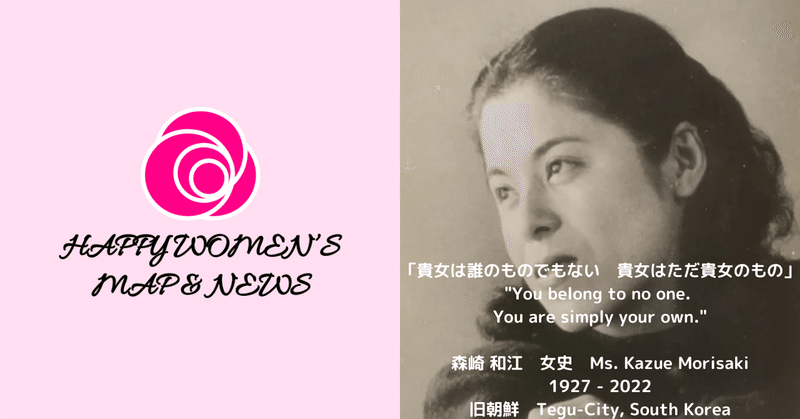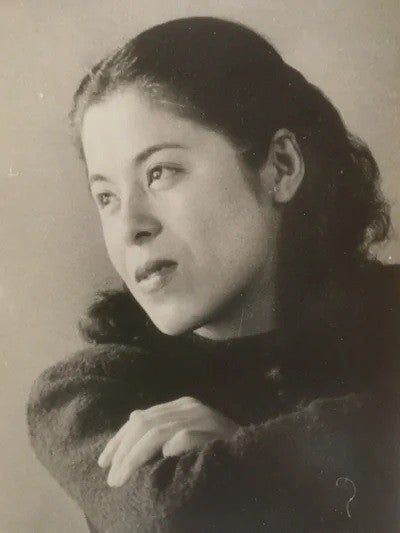
Happy Women's Map 旧朝鮮 女性問題の草分け作家・詩人 森崎 和江 女史

「あなたは誰のものでもない あなたはただあなたのもの」
"You belong to no one. you are simply your own."
森崎 和江 女史
Ms. Kazue Morisaki
1927 - 2022
韓国大邱市 生誕
Born in Tegu-City, South Korea
森崎 和江女史はフェミニズムまたウーマンリブの草分け的思想家です。谷川雁、上野英信・晴子夫妻ともに文学運動・サークル村を創始。さらに日本全国の辺境を訪ね歩いて、女炭坑夫・海外売春婦・海女など女性労働者はじめ、女性史について多くのノンフィクション、また詩集を刊行しています。
Ms. Kazue Morisaki is a pioneering feminist and women's liberation thinker. She, along with Mr. Kan Tanigawa and the husband-and-wife team of Hidefumi Ueno and Haruko Ueno, founded the literary movement and community known as "Sākuru Mura." Furthermore, she traveled extensively throughout Japan, visiting remote regions, and authored numerous non-fiction works and poetry collections concerning female laborers, including women coal miners, overseas prostitutes, and ama divers, making significant contributions to the field of women's history.
*******
「慶州は母の叫び声」
和江は、朝鮮人学校の教員に携る父・庫次と、父を追って生家を出奔した母・愛子のもと、日本支配下の朝鮮大邱に生まれます。朝は八十連隊の営所から起床ラッパが風のまにまに住宅地までとどき、レコードからは軍隊風に行進する童謡が流れ、大勢の将兵が出征するのを友達と一緒に見送ります。和江は朝鮮人の乳母また家政婦はじめたくさんのオモニに可愛がられ、朝鮮人の少女たちと一緒に歌い語り合います。そんな中、父・庫次は名士・李秀峯と協力して慶州中学校を創立、校長に就任。一家で慶州に移り住むも、まもなく母・愛子は病床につき死去。和江は下宿して大邱高等女学校に通い始めます。成長するにつれ、朝鮮人の少年また男性たちからは性的侮蔑的な無言の圧力また嫌がらせに怯えるようになります。
「わが身の罪深さが一度に照らし出された」
敗戦間近の17歳のときに、父の知り合いを頼って福岡県女子専門学校(現・福岡女子大学)に入学。まもなく一家で福岡に移り住みます。文学科も家政学科もないのでしかたなく保健科で学びます。和江は日本を郷里とするべく方言を必死で覚えます。ある日、クラスメートである炭鉱町の医者の娘から、汗にまみれて働いている人々が皆日本人だと聞かされてひどいショックを受けます。太平洋戦争下の学生動員中には、休み時間に絵を描こうとすると「非国民」とキャンバスを蹴り飛ばされます。食べるものは米粒がありやなしかの粥ですっかり食欲を失います。終戦後、結核の治療のために佐賀で療養生活を送りながら詩作をはじめます。父の郷里・久留米に移り、同人誌・『岬』、丸山豊が主宰する詩誌『母音』で作品を発表し始めます。
「女の抱き方を知らん労働者は、本質において労働者をしめ殺しよる」
敗戦後の新しい日本のもと、和江はNHK福岡放送局でラジオのエッセイや、ラジオドラマの脚本を担当。まもなく結婚、ラマーズ法を実践する産婆を探し出して長女を出産します。同時に父親が死去、妹を引き取って同居を始めると、弟が早稲田大学在学中に自死。和江は福岡県女性史の編纂に参加して、長女を抱いて博多の遊郭を訪ねたり、ボタ山が燃える炭鉱町を見て歩きます。まもなく、安保闘争・三池争議の高揚とともに、谷川雁、上野英信・晴子夫妻ともに筑豊の炭坑町・中間に転居。文化運動芸誌『サークル村』を創刊、女性交流誌『無名通信』を刊行。 職業・学歴・地域・性などによって分断された人々を結ぶ場となるはずが、労働者同士の分裂を招いて会員同士による強姦殺人事件を引き起こします。
「日本の1人の女に生まれ変わりたいと思って」
「女に関することは闘争と別と思っとろう」「たかが強姦ごときで…。大事の前の小事だ。」和江は雁とのこどもを流産します。「よかなー、一緒に泣いてくれる人のおらすばい。わしは10回も掻きだしたばってん、夫はしらんふりしとる」和江は雁と決別、ひとり炭鉱町に残って女炭坑夫の聞き語りを集めます。さらに、そのへんの草木と同じにみられていた女性の苦悩、商品として扱われていた女性の苦悩を、女性問題として社会に認めさせる運動を起こします。海外売春婦(からゆき)・海女はじめ日本列島各地の集落ではたらく女性たちを訪ねては、方言での聞き語りを集めます。
"Keijo is the cries of Mothers"
Kazue was born in Daegu, under Japanese rule in Korea, to her father Koji, who was a teacher at a Korean school, and her mother Aiko, who had left her family to follow her father. The sound of the morning bugle call from the 80th Regiment reached the residential area in the wind, where martial songs played from records and they watched as numerous soldiers left for the war. Kazue was cared for by many Korean women, including a wet nurse and housemaids, and she sang and conversed with young Korean girls. Amidst this, her father Koji collaborated with scholar Lee Su-bong to establish Keijo Middle School, where he became the principal. The whole family moved to Keijo, but soon after, her mother Aiko fell ill and passed away. Wahe began boarding at Daegu High School for Girls. As she grew, she started experiencing silent, sexually degrading pressure and harassment from Korean boys and men.
"My own sinfulness was revealed all at once."
At the age of 17, as the defeat of Japan neared, she entered Fukuoka Women's Specialized School, thanks to an acquaintance of her father. The whole family moved to Fukuoka. There, she pursued a degree in health science since there were no programs in literature or home economics. Kazue desperately learned the local dialect to assimilate herself into Japanese culture. One day, she received a severe shock when a classmate from a coal mining town informed her that the people toiling in the fields, drenched in sweat, were all Japanese. During her student mobilization in the Pacific War, she was ridiculed as a "traitor" when she tried to draw during breaks, and her canvas was kicked away. She lost her appetite, with meals consisting of nothing more than a few grains of rice in a watery gruel.
"Workers who do not know how to hold a woman strangle the essence of labor"
Kazue said in the post-war era in the new Japan. She worked on radio essays and radio drama scripts at NHK Fukuoka broadcasting station. Shortly after, she got married and sought out a midwife practicing the Lamaze method to give birth to her eldest daughter. At the same time, her father passed away, and she took in her younger sister. Her brother, who was studying at Waseda University, committed suicide. Kazue participated in the compilation of the history of women in Fukuoka Prefecture. She visited brothels in Hakata while holding her first daughter and walked through coal mining towns with burning slag heaps. Soon after, with the rise of the Anti-Security Treaty protests and the Miike Coal Mine strikes, she, along with Gan Tanigawa, Eishin Ueno, and his wife, relocated to Chikuho, a coal mining town. She founded a cultural movement magazine called 'Circle Mura' and published a women's exchange magazine called 'Mumei Tsushin.' This was meant to serve as a space for people who had been divided by their occupation, education, region, gender, and other factors, but unfortunately, it led to further division among the workers and resulted in a rape and murder incident among the members.
"Want to be reborn as a Japanese woman"
"You think matters related to women are separate from labor struggles, right?" "It's just a matter of rape... a minor issue in the face of greater concerns." Kazue suffered a miscarriage and parted ways with Gan Tanigawa. "You're lucky, having someone to cry with. I've had ten abortions, but my husband pretends he doesn't know." Kazue stayed alone in the coal mining town, collecting stories from female coal miners. Furthermore, she initiated a movement to make society acknowledge the suffering of women, who were regarded as no different from the surrounding vegetation, or treated as commodities. She visited women working in various communities across Japan, such as overseas prostitutes ('karayuki') and ama divers…, to colect their interviews of local dialects.
-福岡県男女共同参画センター FUKUOKA PREFECTURAL GENDER EQUALITY CENTER
-RKB毎日放送 / RKB Mainichi Broadcasting Co.

Share Your Love and Happy Women's Story!
あなたを元気にする女性の逸話をお寄せください!
Share your story of a woman that inspires you!
この記事が気に入ったらサポートをしてみませんか?
